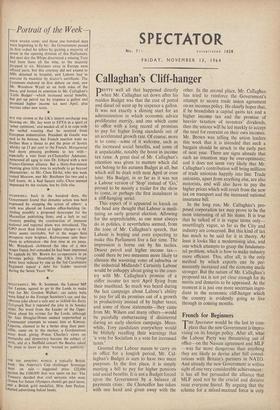Portrait of the Week— FOUR WEEKS GONE, and those one
hundred days were beginning to fly by: the Government passed its first ordeal by tellers by gaining a majority of seven in the opening division of this Parliament. But next day the Whips discovered a missing Tory had been there all the time, so the majority dropped to six. Ministers away in Europe were Offered pairs, but this courtesy did not extend to MPs detained in hospital, and Labour had to exercise its mandate by doctor's certificate. The Commons endured its first debate on steel, saw Mr. Woodrow Wyatt sit on both sides of the fence, and turned its attention to Mr. Callaghan's 'Little Budget'—which increased social benefits, but put up petrol tax by sixpence a gallon and Promised higher income tax next April, plus various other new taxes.
BUT THE STORM at the UK's import surcharge was blowing on: Mr. Jay went to EFTA in a spirit of 'sober optimism,' and needed all of it to cope with the verbal roasting that he received from European industrialists. President de Gaulle was said to be furious, but French reaction went no further than a threat to put the price of Scotch Whisky up 15 per cent to the French. Mongeneral had more pressing problems to toy with— especially a visit from ex-Chancellor Adenauer, rumoured all agog to ruin Dr. Erhard with a new Franco-German alliance. But a thirty-five-minute meeting gives little time to anybody to go beyond Pleasantries: so Mr. Chou En-lai, who this week visited Moscow, met Mr. Brezhnev for two and a half hours. At a Red Square rally, Chou seemed impressed by the rockets, but by little else.
MEANWHILE, back in the hundred days, the Government found that dynamic action was best expressed by stopping the action of others: a curb was placed on London office-building (in- cluding possibly a proposed skyscraper for the Macmillan publishing firm), and a halt to rail Closures pending the construction of immense national and regional plans was introduced. The GPO more than hinted at higher charges—a 4d. letter seems inevitable, but in the wages field Prospects were brighter. Railwaymen sent their claim to arbitration—the first time in six years, Mr. Woodcock clobbered the idea of a new wages freeze, but conceded he had been impressed by appeals by Mr. Brown for co-operation in an Incomes policy. Meanwhile the UK's foreign debts were reduced by one as the 3rd Carabiniers Regiment repaid a debt for fodder incurred during the Seven Years' War RELUCTANTLY, Mr. R. Sorensen, the Labour MP for Leyton, agreed to go to the Lords to make way for Mr. Gordon Walker: car safety belts were fitted to the Foreign Secretary's car, and the obvious joke about a safe seat so tickled the Daily Telegraph that it repeated the joke in its Sunday sister. No word from the Leader of the Oppo- sition about his victims for the Lords, although Sir Alec Douglas-Home seemed unperturbed at•Communist attempts to unseat him at Kinross. Ceporin, claimed to be a better drug than peni- cillin, came on to the market, a Gordonstoun essay book giving Prince Charles's views on monarchy and democracy became the subject of writs, and at a Sheffield concert the Beatles asked the press to leave as they 'wanted no publicity.'
*
POR THE SPORTING WORLD, a typically British Week: the America's Cup challenger Sovereign went on sale — suggested price £22,000 against the £100,000 that was spent on her. The Treasury decided that civil servants who were chosen for future Olympics should get paid leave, and a British gold medallist, Miss Ann Packer, started advertising baked beans.










































 Previous page
Previous page